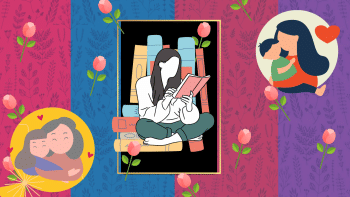Connecting generations through stories

Is there a word for that moment when you crack open a book, and the distinct scent of someone or maybe the memory of them hits you like a sucker punch to your gut? The nostalgia, unmistakeable; you, unprepared. Is there a word? There should be. While today may not be the day for me to go about submitting ideas to Websters for consideration, (although I highly recommend 2020's The Dictionary of Lost Words by Pip Williams if you want a solid read about the world of words), I thought I'd share a little bit about said moment.
While diving into what is possibly my favourite pastime, i.e., spring cleaning my bookshelves, I came across an old copy of An Equal Music (1999) by Vikram Seth, that I had bought from the streets of Kolkata, some 18 years ago. This copy drew me because I remember buying two of the same, one for myself and one for Dadabhai, my paternal grandfather, who was possibly the greatest bibliophile I knew. Years after his passing, I still aspire to have a library as handsome and pristine as his.
Excuse the cliché, but the smell of those ageing, somewhat neglected yellowed pages conveyed me back to an exact moment in time that Dadabhai and I sat discussing this very book, our individual copies in tow. Individual, because my brilliant yet slightly eccentric grandfather did not believe in letting mere mortals with their grimy fingers and questionable hygiene standards borrow anything from his prized collection. I remember fawning over how poignant the storytelling was and Dadabhai, not one to sugar-coat thoughts, completely dismissing it as illogical, boring, and devoid of real sentiments. Years later, 65 pages in, I wish I could call Dadabhai and let him know that he was right; it really isn't made up of the same greatness as Seth's other work. How he would love that; partly to hear his grandchild's voice on the other side, but mostly for being right.
This got me thinking about the sheer power of stories and books and how it creates the most unfailing and lasting connection between generations. Some of my most fervent memories from my chaotically loving childhood is of my Nanuji gathering all of us cousins, big bowl of rice and curry in hand ready to be prepped into balls and stuffed into our ravenous mouths, while reading Sukumar Ray's Hajabarala (1921) and Abol Tabol (1923). Books that were birthed even before her and undoubtedly passed on through readings from her own kinfolk.
And when we had exhausted every page of every book she had in hand, the master of all storytellers emerged—Nanuji herself. I remember the colourful characters (some even recurring and with their own spin-offs), their exuberance, each with their own conflicts and the dramatic climax. Each story more incredible than its predecessor. I know from Nanuji's brilliant improvisations and tale-making prowess, that my love for stories is thoroughly genetic.
Now that I am a mother of a two-year-old whose love for books possibly surpasses my own, I find myself telling him tales that I grew up with. Just the other day, while getting him ready for his nursery, I recalled the whimsical tale of the handkerchief that transforms into an adventurous cat from Ray's Hajabarala and laughed out loud to myself.
My mother-in-law, whose archiving talent needs to be celebrated in top museums, sent us some of my partner's favourite books from when he was a child. The very copies that he used to read, in mint condition! It was so incredible to see my son practically leap to some of those copies and devour them just the same. Let's just say that the copy of Clark the Toothless Shark by Corinne Mellor (1996) is no longer in mint condition. Sorry MIL.
My heart is turned into a messy mush when I witness my father holding my son and reading a plethora of Julia Donaldson books to him. Donaldson's most notable works and my child's favourites include The Gruffalo (1999), Room on The Broom (2001), Zog (2010); books that are from a generation much after my father's or my own. Yet, I still see joy and fascination in my father's eyes narrating such timeless tales of dragons and witches and friendly monsters.
That is the power of stories and books; there is no superior medium that connects generation as closely as it does. As Coelho famously said, "The power of storytelling is exactly this: to bridge the gaps where everything else has crumbled." There may not be a way for me to take my son to those lazy rainy days in my Nanu's Mirpur veranda, but the hope is to keep my roots and my ancestors alive in him through the magic of stories and the flutter of pages.
Sarah Ismail Bari is a full time corporate slave, overtime mom, part-time reader and a chronic daydreamer.

 For all latest news, follow The Daily Star's Google News channel.
For all latest news, follow The Daily Star's Google News channel. 










Comments